 Ever wonder if you should separate your pet rats because of aggression, illness or age? There are times when separating one or more rats is the best thing thing you can do. However, there are also times when separation is NOT necessary and can even make situations worse. Because it can be confusing, here are guidelines on when to (and when not to) separate.
Ever wonder if you should separate your pet rats because of aggression, illness or age? There are times when separating one or more rats is the best thing thing you can do. However, there are also times when separation is NOT necessary and can even make situations worse. Because it can be confusing, here are guidelines on when to (and when not to) separate.
To view a particular section, click on one of the following links:
- Aggression toward people
- Fighting with other rats
- Introducing new pet rats
- Life stages
- Males and females
- Post-surgery/hospitalization
- Respiratory disease and other medical conditions
Aggression toward People
When one of your rats bites or shows other signs of aggression toward humans but not towards other rats, keep your aggressive rat with your other rats. Being around your trusting, sweet-tempered rats can help your aggressive rat learn that humans are downright neighborly.
Besides keeping your human-aggressive rat housed with your other rats, experiment with the tips found in Transforming Your Rat: From Shy to Social Butterfly and Bonding with Your New Pet Rats in Three Easy Steps. It’s all about setting up your aggressive rat for success. Don’t give your biting rat a chance to even come close to biting you. Instead, create situations and brief interactions where your rat either won’t want to or won’t be able to chomp on you.

Fighting with Other Rats
If your rats are fighting with one another and there’s danger of blood being shed— which often results in significant injuries—immediately isolate the aggressive rat.
Situations & Solutions
-
- If your aggressive rat has only recently been introduced, going back a few steps in the introduction process will, in many cases, eliminate the aggression.
- If your rats have all been living together for quite awhile, a sudden outbreak of fighting that’s initiated by one or more males could be due to hormones. If this is the case, neutering can often be beneficial.
- When aggression breaks out after your rats have been living peacefully together for some time, the best thing to do is to have your rats examined by a veterinarian who’s experienced with and knowledgeable about pet rats. If one of your rats is being picked on, your veterinarian may detect there is an underlying illness beginning to surface. In this situation, you may need to separate your rats so your sick rat can live in a peaceful, safe and stress-free environment. If you prefer, you can also have your more vulnerable, sick rat visit with your other rats solely during times in which you’re on hand to supervise.
Introducing New Rats
- When you already have rats, any new rats coming into your home need to be quarantined.
- During the initial introductory process, you’ll want to keep their interactions very brief. The goal is for your rats to be enthusiastic and excited about one another. This is best achieved by limiting their time together. That way they just can’t wait until the next time. In between the introductory sessions, they’ll need to continue to be housed separately. For more information on the introducing new pet rats, see How to Ace Pet Rat Introductions.

Life Stages
Babies
- Can be weaned at four to five weeks of age at which time they can be separated from their mother.
- Should be at least six weeks old before introducing them to adult males. If you are adopting a baby to whom you’ll be introducing one or more male rats, see if the baby can stay with the mother and littermates until 6 weeks of age.
It is very difficult to optimally feed both babies and adults—who have different nutritional requirements—while they’re living together.
Solutions
- For a few hours each day, house your baby and adult separately or partition their cage during which time they’ll only have access to their own, age-specific food.
- While they are in the same cage, provide both types of food. It’s nice when you can spend time near their cage so you can monitor and switch each rat to their age-appropriate food when needed.
Seniors

Older rats most often need to live in one-story cages or, if they do live in a cage that’s two or more stories, all boxes, hammocks and hideouts should be kept close to the ground to prevent injuries from falling. Ramps need to be adjusted so the grade isn’t too steep for them.
Seniors can live with younger rats as long as they’re not being “picked on” and they have easy access to food and water. Check to make sure your younger rats aren’t hoarding and hiding the food.
Males and Females
Since males and females have such different personalities, it’s a lot of fun to have both. Opposite sexes can live together as long as the males are neutered and/or the females are spayed. Spaying the females is preferable since it benefits them more than males, health-wise. Spayed females are less likely to develop mammary and pituitary tumors and are more likely to live longer. However, it’s not always easy to find a veterinarian who’s experienced and competent with rat spays. If you don’t have a veterinarian in your area who can perform rat spays, neutering your males is a great option.
Additionally:
- Boys must be separated from their mother and littermates before they’re five weeks old to avoid the risk of impregnating the females.
- After a male rat is neutered, he needs to be kept separate from females for at least three weeks.
- Unless you’re a professional breeder, there’s absolutely no reason to house unaltered rats of the opposite sex together.
When to Separate Pet Rats Post Surgery
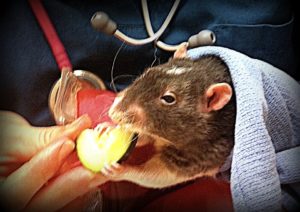
Every situation is unique. Check with your veterinarian to make sure it’s okay for your rat to be housed with cagemates following a surgical procedure.
Overall Guidelines
- It’s always important to monitor closely after bringing your rat home from surgery.
- After spending time in a veterinary hospital, your post-surgery rat will smell different to your other rats. Sometimes your rats who’ve been home all day may be fearful of the unfamiliar scent of your rat who was at the vet. This can result in fighting due to fear.
While there are many exceptions, and each case is very individual, here are some general guidelines for whether or not to separate pet rats after surgery:
Complete separation
When a rat has had surgery and has sutures, an e-collar or anything else your other rats could chew on, it’s most often best to keep your recovering rat completely separate for at least the first twenty-four hours. This gives them time in which to heal before your other rats have a chance to interfere with (and possibly compromise) the benefits of the procedure.
If your rat does have an e-collar, you’ll need to keep it n separate housing from your other rats for the entire time in which the e-collar needs to be worn. The collar keeps your rat who had surgery from chewing on the incision site. You don’t want other rats chewing on that area as well. You can have them out together as long as you’re there to directly supervise them.
If you can, keep your post-surgical rat nearby you for the first twenty-four hours in a small carrier (such as a cat carrier or this portable/collapsible cage. This makes it much easier to keep a close eye on your rat. If you’re not able to remain in the same room, a webcam is a great way for you to observe them. If you’re using a webcam, be ready to immediately tend to your rat if any problems occur.
An example of a surgical procedure when you’d definitely want to separate pet rats is after a rat is spayed. This is true regardless of whether or not they’re wearing an e-collar. Most rats who are spayed do need to wear an e-collar.
So far, I’ve had three rats spayed and each time, I’ve kept my girls with me for at least the first day and night. I’ve even slept with them tucked into my shirt, throughout the night. They seemed to welcome being with me. If you find your rats prefer to rest comfortably on their own, place them in a cat carrier nearby to where you will be sleeping that night. Set up the carrier with comfy bedding, food, water and a bathroom area towards the back. It’s a very individual decision on how to best keep your newly spayed female rat comfortable. The decisions you make should be based on your close observation of your rat’s needs. 
Separating rats post surgery for specific periods of time
If your rat has had surgery and your veterinarian thinks your rat will be fine living with your other rats, you’ll still want to observe closely to make sure your other rats don’t harass her. If you’re not able to be nearby their cage for the entire first twenty-four hours or so, place all of your rats together just for the period of time in which you’re able to supervise. This can be while you’re sitting on the sofa with your rats or when they’re all in their cage. Oftentimes, shared activities keep rats from picking on one another. An example of a shared activity is to give them a dish of yummy food they can all enjoy.
For the first night, if you have any doubts about whether or not your rat is safe staying with your other rat(s), keep your recovering rat in a smaller, separate enclosure such as a cat carrier. Preferably, keep the carrier close by to where you’re sleeping.
When not to separate pet rats post surgery
In many cases, rats who’ve had surgery can be reunited with their roommates as soon as they return home from the veterinary hospital. If the rat who had surgery has no external sutures that could be chewed out, it’s often fine for them to be with their friends. After observing how they’re behaving for several hours, you’ll get a feel for whether or not they can remain together. If they’re all getting along fine, your recovering rat will be comforted while healing with his buddies by his side.

Respiratory Disease and Other Illnesses
A pet rat who’s been diagnosed with respiratory disease does NOT need to be separated from your other rats. Any rats who’ve already been living with your recently diagnosed rat has already been exposed, so it’s too late to separate. Besides, almost every pet rat already has mycoplasma and this is true whether or not they show symptoms. Make sure your rat with respiratory disease symptoms is seen by a knowledgeable, experienced veterinarian who can prescribe any necessary medications and treatments.
If your rat is sick with other diseases such as a pituitary tumor or even with advanced respiratory disease, observe closely to see if your rat still benefits from interacting with his or her cagemates. If you find your other rats are stressing out your sick rat, it’s probably best to keep them separate.
Each situation is unique. Some rats take care of one another while others will attack any rat that appears weak or sick. You’ll need to observe closely and intuitively decide for yourself what’s best for your sick rat. You know your rats better than anyone.
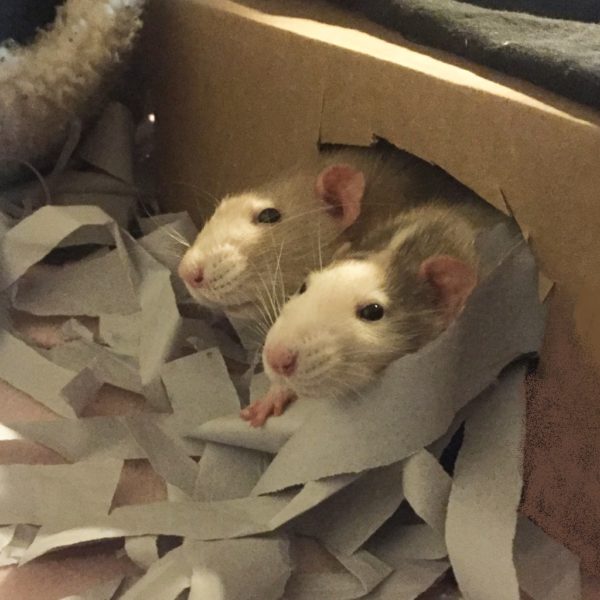
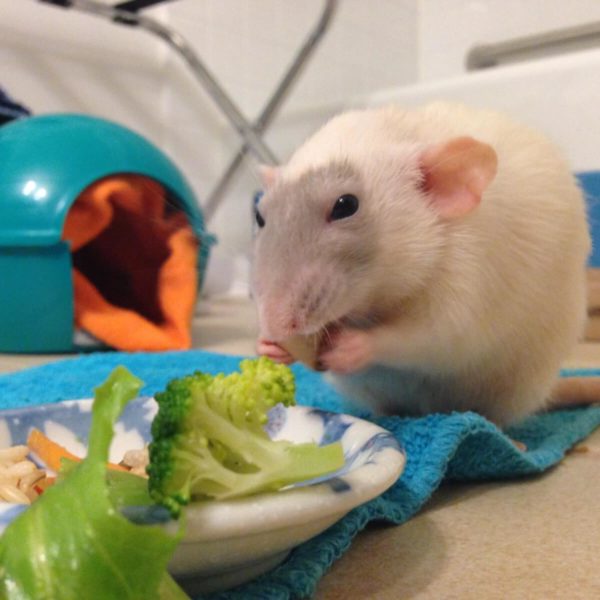
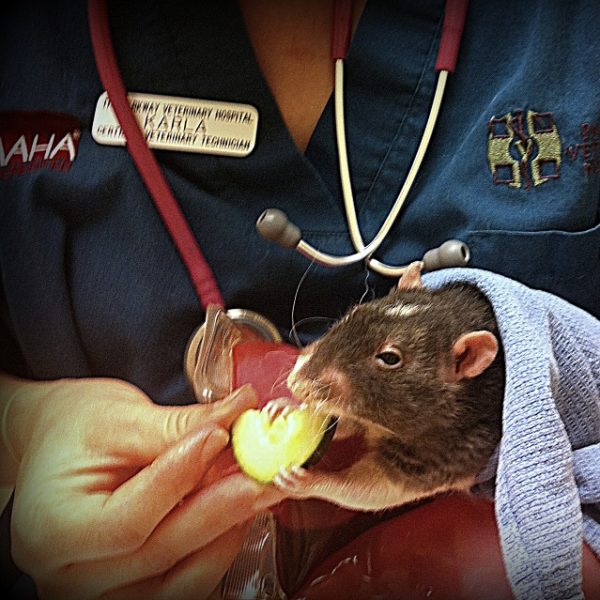
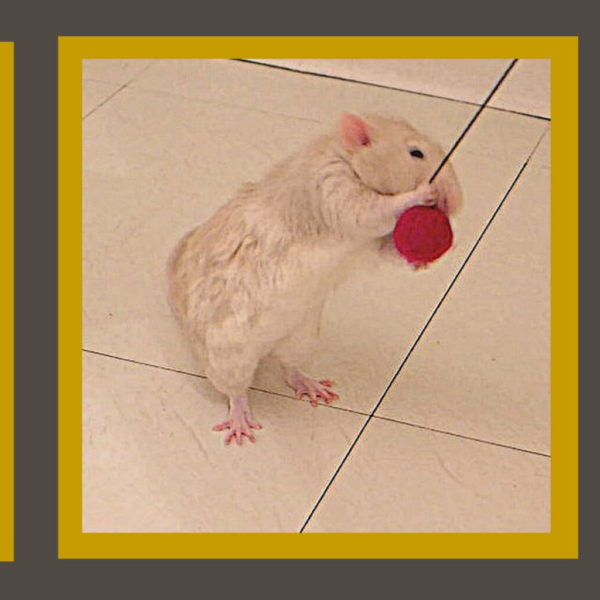



hi, i have two male rats and one of them bit the other because there was food in front of their cage and honestly, they got along well afterwards. Of course, the one that got bit has a wound under its ear. Should i separate them? In all honesty they act great together but i dont want my rat to pick on the wounded rat. What do i do?
Hi Ari,
I’m sorry I wasn’t able to respond sooner….how are your rats doing now?
If they “generally act great together” (as you said), this may have just been an unusual occurrence. In any case, I would check out the warning signs of pet rats not getting along in Play, Tiff or Clash: Understanding Pet Rat Relationships. In this article you’ll see that there are signs that definitely indicate your rats are not getting along. (Such as their fur being puffed up, standing on their hind legs, etc.)
Any time a rat has a wound, I do advise having them checked out by your rats’ veterinarian. There’s always a chance of infection. If there is a possibility of an infection, your vet may prescribe antibiotics. Additionally, wounds can be more serious than you think. I once had an emergency vet notice that my rat had more damage done than what I first noticed. It’s always good to have an expert check out your rat.
Can you read about the behaviors to look out for outlined in Play, Tiff or Clash and see how your rats compare?
Please let me know if you need any clarification and/or if you have any additional questions. I’m happy to help anytime. As I mentioned, normally I can respond sooner. If you want to email me more questions and/or an update, I’ll respond as soon as possible.
Best Wishes to You & Your Rats,
Jasmine | About Pet Rats
You have to feed them in separate rooms because they get territorial
I have 4 male rats, they are 9 months old and brothers. One of them(Schmidt) is bigger than the others and pins the others down so i assumed he was the “alfa”. Today i saw 2 of the others( Nick and Winston) fight, something that i’ve never seen before. They were both on their back paws, and it proceeded to them actually fighting. I didn’t have time to stop them. I was already considering neutering Schmidt because i thought he was the alfa but now i don’t know which one i should. Also, because this is the first time it happens, i don’t know whether it was Nick or Winston who started the fight. Should i neuter more than one? I don’t know which one to choose and i’m afraid if i wait longer fighting will happen again.
Hi Ines,
Thanks for asking your excellent questions!
First I want to say that, just because a rat has established dominance and is the “alpha” rat doesn’t mean he needs to be neutered. It is common for one rat to be the alpha rat. As long as the other rats are okay with being submissive to the alpha rat, they can all live together harmoniously.
Neutering can be very helpful for aggression. Aggression is not the same thing as establishing dominance. An example of the type of aggression that is resolved by neutering is when you have a rat who initiates serious fighting. As described in this post, you can tell if they’re really fighting if they stand on their hind legs, have puffed up fur, give a backwards kick to the other rat, making hissing sounds, etc.
You mentioned you saw Nick and Winston standing on their hind legs fighting. That is much more concerning than seeing Schmidt pinning the others down. (….as long as the others submit rather than fight Schmidt’s pinning.) Could you notice which rat initiated the fight between Nick and Winston? If you couldn’t tell, you may want to have both of them neutered. That kind of fighting (on their hind legs) is a sign of serious hostility.
I hope this gives you more clarification on what to look out for when deciding which rat(s) to neuter. Don’t hesitate to let me know if you have additional questions.
Best Wishes to You & Your Rats,
Jasmine | About Pet Rats
Hi, I have 4 female rats. The oldest is sick. She has multiple tumors. They are small enough for her to still be able to climb, run and anything else she wants to do, she eats and drinks with the same enthusiasm as always. But the other rats are picking on her a lot. In the middle of the night I’ll hear screaming from the cage that doesn’t stop until I do something about it. Which is heartbreaking to listen to. Why do they do that? And how do I stop them? The same thing happened with her sister when she was alive. Usually I’ll make a loud noise or let them know that I’m watching them and they’ll stop for a little while or I’ll throw food in to distract them or take her out of the cage. There has been no serious injuries but I can feel callouses from scratching here and there. Mostly on the sick older rat but also a few on the others. And I know that they’ll also scream just to say go away I don’t wanna play, but most of the time I think it’s cause she’s scared. They have all been living together for almost a year. And they do still sleep next to each other, altough at times she will choose to sleep alone on the bottom of the cage while the others are in hammocks on the top. Her sister used to do the same thing. Would it be better to separate them and let her live alone in her last weeks or is she okay with the others?
Hi Sara,
Thanks for asking your important question.
My first question to you is, you wrote “The oldest is sick. She has multiple tumors.” Are you saying she has other health issues besides tumors? Just thought I’d check on this first since tumors are a medical condition, but they’re not a sickness.
Also, in most cases, tumors are very easy to remove. I’m wondering why you’re not having her tumors removed. Doing so would not only help your rat but it could also resolve the problems you’re having. I highly recommend having the tumors removed unless your rat has other conditions such as advanced respiratory disease. You mentioned the tumors are small so this makes it an even better time to have them removed.
In terms of what you can do (besides removing the tumors) I’d recommend keeping them in separate cages during times when you’re unable to supervise her. This would include when you’re out of the room and when you’re sleeping (if you sleep in the same room as their cage). Whenever you’re right there to stop the other rats from harassing her, though, it should be okay to have them together. Just be ready to separate them if the other rats start being aggressive towards her. I’d set up a separate cage right next to their main cage for her so they can still be near one another.
Also, you mentioned callouses and scratching. By callouses, do you mean scratches that are healing? Usually rats don’t scratch other rats but they do sometimes scratch at themselves. Sometimes they’ll scratch because of external parasites. Have your rats been examined by a veterinarian who’s knowledgeable about and experienced with pet rats? If not, this would be the perfect time to do so. It may be that they need a parasiticide prescribed if they do have external parasites.
I’m also wondering if she has other conditions besides tumors, since you said these are her “last weeks”. Feel free to email me additional information in case I’m misunderstanding your situation. Otherwise, it would be best to have them all examined by a vet and to have the tumors removed if at all possible.
Don’t hesitate to let me know if you need any clarification or have any additional questions.
Best Wishes to You & Your Rats,
Jasmine | About Pet Rats
Hi
I have an elderly male rat who I bought some cage mates for after his brother passed and we are struggling to get them to bond. He is fine when placed with one of the boys (neutral territory) but becomes immediate aggressive when placing another into the same territory, or introducing them at the same time. Their cages are next to each other and they all sleep as close to each other as they can (the 3 young males lay against the same side of the cage as the elderly male) and he shows no signs of aggression whatsoever. I’m considering trying to house the one rat with him, but if that isn’t an option do you think he will be happy simply being neighbours rather than cage mates ? I don’t see any signs of depression in him, still eating and excited to come out for free roam time. Thanks
Hi James,
I think the secret to having them start to get along is to set up shared experiences for them. I go over this in detail on my article How to Ace Pet Rat Introductions. (Not sure if you’ve read one this yet.) If they’re all in a totally unfamiliar environment and they all share a (liquid/lickable) snack from the same plate, it helps them feel like “we’re in this together”. The same feeling is created when they’re in a new environment and they’re all exploring it together for the first time. Later in the introduction process, I’ve even had them inside their cage but the cage was completely different from how they’d ever seen it. (For example, placing new objects such as tree branches for them to climb on inside the cage.)
If he’s fine with just one rat being introduced to him, I’d start with rotating each of the new rats so they each spend some one-on-one time with him. Then, after several days of doing this several times a day, I’d introduce 2 new rats to him and do that for several days. Then, finally, I’d try all 3 new rats.
Another key detail is to make their introductions brief—-end them after 5 minutes, or whatever time you determine. End it early so he’s wanting more, so he’s disappointed the time is over and can’t wait for the next time. This idea is also included in my article How to Ace Pet Rat Introductions.
That’s great that they all sleep as close to one another as they can while they’re in their separate cages. That’s a very good sign. Normally, if it wasn’t going to work out, at least one of the rats would have puffed up fur when it saw the rat it didn’t want to be with even if the other rat was in a different cage.
To answer your question, it would be fine to have 2 rats live together in two separate cages. That’s a perfectly fine solution if you find they can’t all get along and you have the space for 2 cages.
I hope some of these ideas are helpful. Don’t hesitate to let me know if you have questions or need any clarification. Feel free to give me a progress report, too!
Best Wishes to You & Your Rats,
Jasmine | About Pet Rats
Hello! I’m a new pet rat owner and got 4 boys from a rescue in January. They were born sometime in December so I’d say they are about 5 months old. I recently got one of them neutered because he was exhibiting signs of hormonal aggression. He’s the sweetest boy but sometimes he would get into moods where he would just be completely different. He’d chase my husband’s feet and try/ actually bite my husband’s feet during free roam and bite other parts of his body that were skin exposed. He would also puff up and sidle or chase the other boys but never injured any of them. He’s been in recovery after surgery as I type this and he’s ready to be reintroduced and he’s doing a lot better! However, one of my other boys immediately after having my other boy neutered started to be different. He used to get along with them so well! He’s been chasing the other two around the cage, getting puffy, sidling, pushing others off of things. The other two are terrified of him and it’s breaking my heart. None of the boys wants to submit after pinning each other. He hasn’t hurt any of my other rats or us but do you think I’ll have to neuter him as well? My concern is whether I should include him in the introductions or not. Should I separate him from the others until I can get him neutered? I won’t be able to for a while because I had used a care credit card to pay for my boy’s surgery and I can’t use it again until it’s paid off. His surgery was really expensive; around 500 dollars but they specialized in exotic animals. What should I do?
Hi Shaley,
It sounds like your most recent aggressive rat was trying to establish a new pecking order. He saw his opportunity open up when you separated out the male who recently got neutered.
If it were me, I would separate this 2nd aggressive rat and get him neutered as well. You can read about my experience with 3 brothers I adopted and how first one and then a second needed to be neutered on my page on Pet Rat Spaying & Neutering.
If this newly agressive rat is puffing up while around the other rats, that’s a huge red flag. The fact that the others don’t want to submit to him also suggests a good chance of your other rats getting injured due to fighting.
$500 is fairly expensive for a rat neuter. I wonder if you can find another vet who’s less expensive? Even if your vet specializes in exotics, $500 sounds like an above-average price. (I would still make sure to only use a veterinarian who’s knowledgeable about and experienced with pet rats, though.) Or maybe you live in an area in which veterinary fees are higher than our national average?
You could try separating the newly aggressive boy and allow him to only be with the other rats while they’re all being closely supervised by you—-such as during free range time. There’s a chance that once you re-introduce your rat who was neutered, your newly aggressive rat may change his behavior again. You would just need to be super careful and separate them immediately if he has puffed up fur and/or started pinning your other rats without their submitting.
It sounds like you’re doing an excellent job with your rats! I’m so glad to hear that your recently neutered rat is already showing signs of improvement. Neutering really can make a big difference.
I hope my response is helpful. Let me know if you have any other questions and/or need any clarification.
Best Wishes to You & Your Rats,
Jasmine | About Pet Rats
So I was told I have all females when I got 4 rats. Found out one was a male and immediately separated him. I’ll be getting 2-3 young male rats within a week and doing introduction and slowly getting them used to each other. He has been in a cage near the females in the same room so he can see and hear but not touch them but he’s been separated from them for about a week. Will he be ok and is there anything I can do to prepare him for his new cage mates?
Hi Cheyenne,
That’s great you separated your male from your females. Hopefully he didn’t already impregnate one (or more) of your females.
What about just getting your male neutered? That way he could live with the females and you wouldn’t have to get even more rats.
Another option, which you may have already considered, is to get your females spayed. Spaying females helps to greatly reduce their chances of getting mammary tumors and they usually live longer.
It’s not always easy to get females spayed, though. First you need to make sure you have a veterinarian who’s experienced with spaying female rats. There are many vets who neuter pet rats but who have no experience with spaying them.
Second, it costs money for each of their surgeries. Spaying 3 females will easily end up costing several hundred dollars. On the other hand, you could save money in the long run if you get them stayed. When female rats are not spayed, the surgeries they’re likely to eventually need for tumor removal can really add up in cost, too.
To answer your questions:
Yes, in the long run your male rat will be fine if you have him housed separately until you get him new friends. Just make sure to spend extra time with him so he doesn’t feel neglected.
That’s great he’s in a cage near the females so they can all still see and hear one another.
The only thing I can think of to help him get ready for meeting new friends is to (as mentioned earlier) spend lots of time with him. It’s good to keep him well socialized and bonded with you. This will make him more likely to be friendly with others.
Hope my responses are helpful! Good luck with whatever you decide. Let me know if you have any other questions.
Best Wishes to You & Your Rats,
Jasmine | About Pet Rats
Hi
I have two female rats that have been living together for about two months ,the younger one(pavlova) seems to bully the older one(Angelina)and I’m worried because I saw a scab on angelina’s back today when I got back from work and this is the first time she had a wound.Normally they play fight but it seems to get more aggressive especially with pavlova .Angelina distances herself from pavlova and seems anxious around her,she(Angelina) also had a respiratory infection about a week and a half ago now she’s ok.At first I thought they were play fighting but it doesn’t seem like it anymore.They are both such sweet animals and I don’t know what to do.
Hi Kayla,
I completely understand how frustrating it is when you have rats who are fighting and antagonizing one another.
Have you read my post Play, Tiff or Clash: Understanding Pet Rat Relationships? The reason I’m asking is because this article outlines specifically how to tell if they are fighting, playing or simply establishing dominance. (Usually one rat does need to be in charge.) After you read this article, if you can tell me more information I’ll be glad to help further. The things that are in this article that are important to know about are:
– When they “fight” is their fur getting all puffed up? (If not they are likely playing.)
– Does Pavlova pin Angelina on her back? And, if so, does Angelina submit and allow Pavlova to pin her?
Regarding the scab you found, are you certain that it’s a bite wound? Sometimes scabs can be signs of external parasites. Usually if it is a bite wound, you’ll see 2 punctures. One puncture is from the top teeth and the other is the bottom teeth. Or you may find something that looks more like a “gash”. If you see a single scab, it’s more likely to be external parasites.
Feel free to give me more details and I’ll be glad to help further.
Sending positive thoughts for you, Pavlova and Angelina. (Such beautiful names!)
Jasmine | About Pet Rats
I have 2 pet rats, both male, and one of them bullies the other constantly. They’ve lived together almost all their lives now, and are both a bit over 2 years old. Basil (the bully) has always been the more dominant one, but it has gotten worse more recently. They fight fairly often and it’s usually Basil going after Pizzazz (his brother). Pizzazz squeaks and shows he does not like it, but Basil continues. Pizzazz has been losing fur in certain areas and has a few small scabs from fight related injuries. Aside from the fighting, I also assume basil has been over grooming him. My assumption is that Basil is bored, as he is very active and that is often a reason for over grooming. However I give him at least an hour outside of their cage every day, and they live in a big cage with lots of toys. I tried separation for a little while, and Pizzazz seemed better, but he also gained a lot of weight (I’m assuming he ate more since Basil wasn’t in his way), so I’m not sure if that’s the best technique. I’ve seen that neutering would help, but I am not currently in a position to try that (and I’d rather not at his age). Sorry this is long, but if anyone can give me some advice I’d be very very grateful.
Hi Jordan,
Neutering is the best option in my opinion. If Basil is in good health, the surgery shouldn’t be too difficult for him. Just make sure you have a veterinarian who’s knowledgeable about and experienced with pet rats. Your veterinarian can advise you on whether or not he’s a good candidate for the surgery.
I know you said you’d prefer not to neuter, though. Keeping them separated and having them together only when you can be there to observe and supervise could work. You would just need to make sure Basil never had the opportunity to fight with Pizzazz. It also may help to keep them apart so that they miss one another and can’t wait to be together. Keep their together time brief, especially in the beginning. You always want to leave them wanting more. Make it so they really want and anticipate being able to be together again.
You mentioned Basil has been over-grooming Pizzazz. He’s doing that as a form of dominance (not because he’s bored). It’s called power grooming.
Pizzazz could’ve gained weight when they were separated because he wasn’t getting as much exercise since Basil wasn’t chasing him around.
I’m curious to know if Basil every pins Pizzazz down on his back? It would be ideal if Basil pinned Pizzazz and Pizzazz allowed him to do so. (Play, Tiff or Clash? Understanding Pet Rat Relationships)
I once had 3 brothers who had lived together harmoniously for quite some time. Then they started fighting. I got the “bully” rat neutered and all was well again for awhile until another of the brothers became the bully. I then got him neutered and, from then on, they lived together without fighting.
I hope at least some of these thoughts are helpful for you. Let me know if you have any other questions or need any clarification on anything.
Best Wishes to You, Basil and Pizzazz,
Jasmine | About Pet Rats
My smallest female rat is a bully, but I don’t have proper accommodations to separate anyone. I have three rats, a neutered male and two slightly younger females. When I first arranged the group and got everyone introduced, the smallest female was, understandably, at the bottom of the pecking order. They didn’t fight, but she was clearly shy and didn’t challenge the other rats; even though they’re pretty docile too . However, the other female was sick and had to be separated for a time. After being re-introduced to the group, everything seemed fine. But after a while, I started noticing some conflicts. I thought at first that they were just playing, but after further inspection I realized that the smallest female was starting to become aggressive towards the other female. The male doesn’t seem to be involved. They always sleep together and sometimes groom each other, so they must still like each other, but I’ve also seen the smaller female chasing around the other and nipping her, and not stopping when she squeaks or acts distressed. The separation cage I used when the one female was sick is much too small to be used for long term separation, and I have no space for any bigger accommodations, as their current cage already takes up a lot of space. I would really rather not re-home the small female, as she’s bonded with the group and I’m attached to her. Is there anything else I can do?
Hi Maxwell,
You’re asking a really good question!
First, it would be helpful to confirm that your two girl rats are actually fighting. Have you already read Play, Tiff or Clash? Understanding Pet Rat Relationships? If your girl rats are not puffing up their fur or standing on their hind legs facing one another, it’s likely they’re playing not fighting.
If they are actually fighting, I’d try re-introducing the two girls to one another. I know you said you’ve already introduced them to each other so you probably know some good introduction techniques. Just in case you’d like to learn a few more, check out How to Ace Pet Rat Introductions.
If and when you do try re-introducing them, I’d have the girls take turns living in the large cage with your male rat. That way one rat doesn’t feel like she has an advantage over the other. The other one can stay in the smaller cage. You could try swapping them out about every 24 hours. Definitely use some of the tips in my article on pet rat introductions, too.
I hope the above is helpful. If you need any further clarification or want to update me on any additional details, don’t hesitate to let me know.
Best Wishes to You & Your Rats,
Jasmine | About Pet Rats
PS – I tried emailing you to let you know I’ve responded to your question, but the email address you entered doesn’t work. (I received an error message saying “Address not found”. I hope you get to see my answer here!
Hello. I have 5 male rats that have lived together in mostly peace for about 1.5 years (since feb 2020 )the past few days I am hearing a lot of fighting and some of my rats have bite marks on them. They are in a 2 story critter nation I have loads of toys and boxes and hammocks, plenty of food and 4 water bottles. I’m not sure what to do for them to halt the fighting as I haven’t fully sussed out which one or ones are the aggressors. Just when I think I sorted out who is fighting with who I find them sleeping in different groups often with the ones they were spatting with. Blood has most definitely been drawn and I don’t want them living in danger. Ideas??
Hi Elizabeth,
Once blood is drawn it is essential to separate the aggressor(s) from the rest of the rats. You don’t want to risk further physical harm to your other rats.
I’m curious as to whether any of your male rats are neutered. If they aren’t, I would figure out (by observing closely which rat (or rats) are being aggressive) and then have him/them neutered.
After he’s neutered, it can take 6-8 weeks before aggressive behavior will subside. You’ll be able to tell, however, if the rat mellows out a bit sooner. After about 3 weeks, you can try having the neutered rat together with the other rats while under supervision. If all goes well, they’re ready to live together again. If not, wait a few more weeks before trying again.
The introduction techniques in this post work particularly well in my opinion.
What you’re observing in your rats is fairly normal—if they’re a group of unneutered males. Please let me know if they are neutered and I’d be glad to help further.
Best Wishes to You & Your Rats,
Jasmine | About Pet Rats
hey so i had two female rats who lived together their whole life until one got out of their cage (athena) somehow and it took me a week to get her back and she lost alot of weight and now the one sister who was in the cage alone (iris) for a week is being very aggressive towards athena and trying to attack her. but its only in the cage when outside of the cage iris pays no attention to athena… should i separate them?
Hi Mackaela,
First of all, my apologies for not being able to respond to your important question until now.
Are they getting along again just fine now?
It sounds like Athena probably had different scents on her after being out of their cage for so long that Iris was not familiar with. Therefore, Iris may have tried to attack Athena out of fear.
Feel free to email an update if the problem is still occurring. Possibly using a re-introduction process could work. I hope they are getting along much better by now, though. If not, let me know.
Again, my apologies for not being able to answer your question sooner.
Best Wishes to You & Your Rats,
Jasmine | About Pet Rats
Dear Jasmine. I have taken over 3 female rats from someone. They are very friendly towards each other and towards humans. I already had two females myself and a huge cage that can easily house 5, with plenty of places to hide and snuggle. I introduced the two groups slowly and did all the recommended steps to get them used to each other. Including anything I could find to get rats to accept and share a cage. I have introduced many rats before without problem. However, one of the new (big!) females keeps picking fights with the two I already had. It starts with the typical hissing, puffing, sidling and eventually boxing, until it explodes into a ball of fur and teeth. She doesn’t stop when the other is screaming loudly, only when she has them fully pinned down. And even then it takes her a long time to cool down and let go. It’s not uncommon for her to attack again when the other rat is walking away.
At first I let them have a scuffle or two to establish dominance, but the fighting did not stop after a few days. I redid the introduction several times and it always seemed to go well, until they actually had to live together in a cage. The odd thing is, there are moments when she attacks viciously, and other moments when they are all snuggled up into a big happy pile. When she is in aggressive mode, she seeks someone out to attack, even if no-one is bothering her or even nearby. She chases them and even pushes heavy things out of the way to get to her victim. It’s not about food, toys or hiding spots for sure. Sqeaks and peace-moves to make her stop before the fight are often ignored when she is in such a mood. And then an hour later they are cuddling again. The other two newcomers fit in just fine.
I can’t figure out what causes or triggers the aggression! The rat she attacks most often does have the sniffles and the aggressive rat has a mammary tumor that can’t be removed without killing her, maybe that has something to do with it. They are similar in age, about 1.5 year old. I’m not sure what to do in this situation. Playtime outside of the cage and more toys and hiding places also didn’t do the trick. It’s sad to put the aggressive rat alone in a tiny spare cage, but I feel bad for the other girls, who only get pestered and more stressed. Do you have advice?
Hi There,
I am so sorry I wasn’t able to respond until now. I’ve been taking care of a 2 sick rats and they’ve taken up literally all of my spare moments.
I’m hoping that by now you’ve figured out a way to help with your aggressive rat situation. I really feel for you. That type of situation is not easy. In case I can still be of help to you, here are my thoughts:
It does sound like the mammary tumor could be the cause for your rat’s aggression. She may be feeling extra vulnerable and be overcompensating for her weakness by acting aggressive.
It sounds like your aggressive rat gets along with the 2 rats with whom she was previously housed before you brought them to your home. If that’s the case, can you separate your rats into 2 separate households? One group could be your aggressive rat with just one of her previous “roommates” and the other household could be your original 2 girls with one of the non-aggressive new rats. If you’re able to split your existing cage into 2 living spaces that would be ideal. That way all of the rats would still see one another but there’d be no danger of anyone getting hurt.
If you’re not able to split up your current cage, you could purchase a second cage. If you needed to get a smaller cage you could rotate them back and forth between the cages so they’d all get to enjoy the roomier cage when it was their turn.
You could allow them all to be out together during free range time. The moment your aggressive rat starts puffing up and acting like she wants to attack one of the other rats, you could put her back in her cage while allowing the others to stay out and play. Be careful you don’t get hurt. Once a rat gets into an aggressive mood they may try to attack anything that comes near them. Have a roll of paper towels you can use to gently push your aggressive rat away from another rat she’s trying to attack. You can also drop a small towel over her to get her to stop. A towel over her would also make it easier to pick her up without your getting hurt.
In addition: Have you had your rat with the sniffles examined by a veterinarian who’s knowledgeable about and experienced with pet rats? You may already be aware that it’s important to catch respiratory symptoms early on. This will increase your likelihood of being able to treat and eliminate the symptoms.
I want to say that you’ve done a fantastic job of trying out different things. I hope you’ve been able to resolve things by now. If not, feel free to ask further questions. I hope to be able to respond much more quickly next time.
Best Wishes to You & Your Rats,
Jasmine | About Pet Rats
Hey! I need some help. I have two beautiful boy rats who grew up together. They’ve always been a. Little at ends with each other but generally it’s fun and cute. The past few months the aggression and mounting from one of them is becoming super consistent. The bigger rat, it is hard to tell if he is dominant or not, I honestly don’t think they‘be ever figured it out. The bigger rat used to cut and beat up the other one when it got rough. Now a days the bigger one I think has gained more weight and doesn’t fight back as much and has been ending up with cuts and I believe injured his leg. I think I need to superset them at this point but idk if that’s best for them or not. What I have done recently is I’ve began feeding them separately and keep all good out of their cage. This has helped with some general behaviors but I still think things get quite aggressive at times. I’m pretty sure I need to separate them at this point as they are almost always grooming one or the other (barbering happens) and so many squeaks and bites. Writing this I think it’s time to separate. Should I buy a new cage for the one rat or keep him in a small cage near by. I also don’t know which one should be separated from the main cage and again if they should stay near each other in spectate cages and play together often or really what to do. I’m very sad they beat each other up and stress each other out so much. We love them both and have always been brothers. Thank you so much for the response if you see this
Hi Alyk,
It sounds like one or both of your boys may benefit from being neutered. You didn’t mention whether or not either of them is neutered but my guess is that they’re both unneutered. I once had 3 brothers who got along perfectly fine until they were around 2 years old. Then I had to get the boy who was being the aggressor neutered. This really helped until one of the other, unneutered, boys became aggressive. I got him neutered and then all 3 lived happily ever after. The 3rd brother ended up not needing to be neutered. He also ended up living the longest. The neutering really made a huge difference. You can learn more about neutering HERE.
If you do separate them, it would be great if they could still be in cages side by side so they would at least feel like they still had “company”. If your 2nd cage is smaller you can always switch them back and forth so it’s not just one rat who lives in the small cage all of the time. You will need to separate them for awhile even if you get them neutered. The page on neutering referred to above will give you information on how long it may take in most cases before the aggression will subside.
I really do think neutering could be helpful for you. It may be that you only need to neuter the rat who’s being the most aggressive. I also hope you take your boys in to be examined by a veterinarian who’s knowledgeable about and experienced with pet rats even if you don’t get one or both neutered. The injuries that were caused can sometimes be so bad that antibiotics should be prescribed to prevent infection.
I hope my response is helpful. Don’t hesitate to let me know if you have any other questions. I’m happy to help any time.
Best Wishes to You & Your Rats,
Jasmine | About Pet Rats
One of my girls was just diagnosed with respiratory disease and the vet said that we SHOULD separate her from the other rats for two weeks. Why would this be necessary when, like you said in the article, my other girls have already been exposed? It’s making me feel so sad to keep them apart.
Hi Elizabeth,
It sounds to me like your veterinarian is not very experienced with or knowledgeable about pet rats. I think it may be good for you to see if you can find a different vet.
Did your vet place your girl who was diagnosed with respiratory disease on medication(s)? Just thought I’d check in on this since that’s very important, too. Also, the length of time they’re on the medication is important. So many vets who aren’t experienced with rats don’t keep them on the medications long enough.
Again, to answer your question, I absolutely do NOT think your rats need to be separated. Your other rat, as you read in my post, has already been exposed. I agree that separating causes further stress and does nothing to help.
Feel free to let me know if you have any other questions in the future.
Best Wishes to You & Your Rats,
Jasmine | About Pet Rats
She’s on Baytril for 2 weeks, does that sound right?
Hi Elizabeth,
Most knowledgeable & experienced rat vets I’ve worked with start with Doxycycline. From what I’ve experienced, Baytril is usually reserved for if other medications don’t work and if the symptoms are quite severe and/or the rat is older. I don’t know how severe your rat’s condition is or how old she is so I can’t say whether or not Baytril is the best choice for her. If you’d like to provide that information, I can respond further.
In my opinion and from my experience, 2 weeks is not long enough for a rat to be on antibiotics. There are exceptions to this and I have to stress that I am not a veterinarian. It is important that you follow the directions of your vet—-AND that you find a vet who’s extremely experienced with and knowledgeable about pet rats.
I’m not sure if you’ve read my page on Pet Rat Respiratory Disease yet. On this page I state that most rats are placed on antibiotics 6-12 weeks. I may need to revise this length of time, however. I do revise what I write from time to time since what veterinarians recommend changes over time. Currently I believe most rat vets prescribe antibiotics for respiratory disease for at least 4 weeks and almost always for a minimum of 2 weeks beyond when symptoms are completely gone.
If your rat who has symptoms is fairly young and her symptoms are mild, I definitely think it would be helpful for you to take her to a different vet. Even just getting a 2nd opinion can be helpful. (Plus it’s always great to have a backup vet.) However, from what you’ve said about your vet telling you to separate your rats along with her prescribing Baytril and for only 2 weeks, your current vet really does not sound very knowledgeable.
Again, keep in mind these are all my opinions based on my (30 years of) experience and that I am not a veterinarian myself.
Let me know if you have any other questions anytime.
Best Wishes to You & Your Rats,
Jasmine
A very informative post. It surprises me when people get a new pet and then just put it in the same space as an existing pet without any introductions. It is just like a human turning up in your home and announcing they have moved in.
Thanks for your comment, Liz. Great analogy. That would be terrible to have a human we’d never met before just move into our home without any discussion or introduction! Introductions are so much fun anyways—I wouldn’t want to miss out on the process of helping rats get to know a new friend without it being threatening.
Jasmine | About Pet Rats